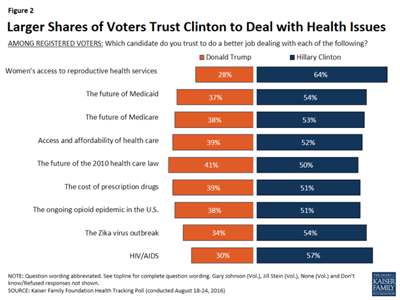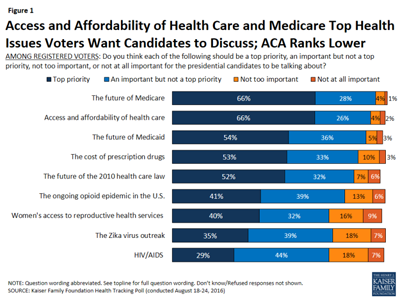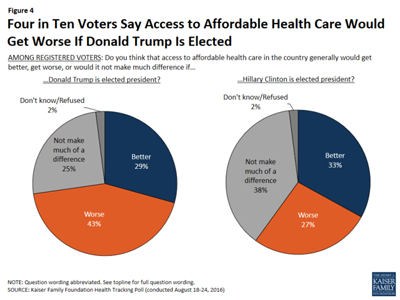
When it comes to health care, more American voters trust Hillary Clinton to deal with health issues than Donald Trump, according to the Kaiser Health Tracking Poll: August 2016 from the Kaiser Family Foundation (KFF).
The poll covered the Presidential election, the Zika virus, and consumers’ views on the value of and access to personal health information via electronic health records. Today’s Health Populi post will cover the political dimensions of the August 2016 KFF poll; in tomorrow’s post, I will address the health information issues.
First, let’s address the political lens of the poll. More voters trust Hillary Clinton to do a better job dealing with health care issues than trust Donald Trump. But, a minority of voters say their ability to access affordable care would improve under either candidate. Demographically, older voters 65 and up are split between Clinton vs. Trump when it comes to who they trust to deal with Medicare.
Overall, it’s both affordability and the future of Medicare that tie for top priority among two-thirds of U.S. voters, followed by the cost of prescription drugs and then the Affordable Care Act’s future.
affordability and the future of Medicare that tie for top priority among two-thirds of U.S. voters, followed by the cost of prescription drugs and then the Affordable Care Act’s future.
By party, Medicare comes up as a top priority for more Republicans. Health care affordability, Medicaid, the cost of prescription drugs, the opioid epidemic, and women’s health issues are top priorities for more Democrats. In fact, except for the future of the Affordable Care Act, more Democrats are keen on health issues than Republicans (among whom a passion about the future of the ACA is presumably a desire to repeal the law).
The opioid epidemic is a new issue that appears in voters’ lists of top priorities for American health care, as well as the Zika virus outbreak which has never been in Americans’ collective radar before this year.
The Kaiser Family Foundation polled 1,211 U.S. voters between August 18-24, 2016, via phone.
 Health Populi’s Hot Points: The issue of health care affordability is top-of-mind for all U.S. voters. Americans are learning how to live with and access health care via high-deductible health plans and facing rising prescription drug costs for some very common treatments. The current EpiPen cost story, coupled with recent media coverage of specialty drug costs for Hepatitis C (e.g., Sovaldi and Harvoni), have created growing awareness among U.S. patients who now realize they’re health care consumers.
Health Populi’s Hot Points: The issue of health care affordability is top-of-mind for all U.S. voters. Americans are learning how to live with and access health care via high-deductible health plans and facing rising prescription drug costs for some very common treatments. The current EpiPen cost story, coupled with recent media coverage of specialty drug costs for Hepatitis C (e.g., Sovaldi and Harvoni), have created growing awareness among U.S. patients who now realize they’re health care consumers.
A plurality of U.S. voters believe that Donald Trump would exacerbate health care cost problems, shown in the pie chart. Note the size of the “worse” pie slice for Trump vs. Clinton: 43% of voters said access to affordable health care would get worse under Trump vs. 27% seeing Clinton as being worse for affordable care.
This poll suggests that U.S. voters who place health care and health care costs as a personal/family high priority will swing toward Hillary Clinton for President.




 I am so grateful to Tom Lawry for asking me to pen the foreword for his book, Health Care Nation,
I am so grateful to Tom Lawry for asking me to pen the foreword for his book, Health Care Nation,  I love sharing perspectives on what's shaping the future of health care, and appreciate the opportunity to be collaborating once again with Duke Corporate Education and a global client on 6th May. We'll be addressing some key pillars to consider in scenario planning such as growing consumerism in health care, technology (from AI to telehealth), climate change, and trust -- the key enabler for health engagement or dis-engagement and mis-information. I'm grateful to be affiliated with the corporate education provider
I love sharing perspectives on what's shaping the future of health care, and appreciate the opportunity to be collaborating once again with Duke Corporate Education and a global client on 6th May. We'll be addressing some key pillars to consider in scenario planning such as growing consumerism in health care, technology (from AI to telehealth), climate change, and trust -- the key enabler for health engagement or dis-engagement and mis-information. I'm grateful to be affiliated with the corporate education provider  Thank you FeedSpot for
Thank you FeedSpot for